Box End Quadrathlon Results and Analysis
This is supposed to be fun. Eating less cake is no fun at all, new bikes and boats are nothing but fun!
The results are out from the Box End Quadrathlon and I did OK. Time for something of an analysis.
The official results are here: http://www.quadracracing.co.uk/images/2018-Quad.pdf, but I’ve added a rank column for each of the disciplines as I like to see that, so here they are with the ranks added.
As you can see:
- I had a good start with the fastest swim split (11:19 for 750m) and the fastest T1 split.
- My kayaking was OK (29.31 for 5200m) Don’t forget I wasted 30-40 seconds by starting an unnecessary 5th lap. I also still consider myself a relative newcomer to kayaking. Many people doing Quads are from a kayaking background so this is often their strongest discipline. On top of that I paddle a surf ski which is inherently slower and significantly heavier than the K1 kayaks that most people paddle (Bryce also paddles a ski). So, 8th fastest in the kayak isn’t too bad I don’t think.
- T2 was a little slow, but that’s thanks to my MTB shoes that aren’t very easy to get on, definitely something to practise for next year though as I could save 10 seconds here without any effort.
- My bike split (37:22 for 15km off-road) was OK with the 4th fastest time but as the bike is the longest portion of the event the time differences here are the greatest, so there’s more time to gain or lose here.
- T3 was OK as well with the 6th fastest split but as it’s such a short part of the race there are only a few seconds lost to the fastest.
- My run (22:16 for 5km off-road) was 3rd fastest of the day, so considering I eased up for the second half of it that’s not too shabby either. Although, the winners run split of 19:49 was not only very fast, but also considerably faster than anyone else’s.
Room for Improvement
There’s always room for improvement. This is true with anything in life, but races and analysing race results provides tangible data with which to work. Multi-sport events are particularly interesting in this regard as there are so many aspects to work on.
Even a single sport athlete has a lot to work on. Take a cycling time trialist. In essence, all they have to do is cycle a certain distance as fast as they can. After the race they look at the results and decide that they want to improve their time. In simplest terms all they need to do is cycle faster, but there’s much more to it than that. Even within this single discipline there are numerous aspects that can be improved upon and by closely analysing race data it’s possible to identify which aspects of one’s performance need to be addressed. As a cycling time trialist this could be any number of things, aerobic fitness, pure power output and strength, aerodynamics, weight, bike handling skills, equipment upgrades, equipment set up, mental toughness, pacing, strategy, flexibility and the list goes on.
As a multisport athlete, each discipline has a list of a things equally as long that could be improved upon. Working on any of these should bring about improvements but we have to decide which areas will bring the greatest gains. This has to be balanced against possible loses elsewhere. We only have a certain amount of time with which to work. Concentrating on one aspect of performance can mean that something else gets less attention. Time isn’t the only constraint here either. Our bodies, minds, relationships and bank balances can only cope with a certain amount of stress so these all limit what we can put into such improvements.
What to Improve
We therefore have to decide from our race results what area to work on for improvement. This could be macro-scale improvements such as “I need to get fitter” or “I need to lose some weight”. It could be sport specific improvements such as “I need to improve my cycling times” or “I need to improve my swim times”. As we delve deeper into each sport we could look at meso-scale improvements such as “I need to improve my paddling technique” or “I need to improve my power output on the bike”, or we could be even more specific with micro-scale improvements such as “I need to work on the catch portion of my swim stroke” or “I need to improve my cornering speed on the bike”.
For me, there are numerous areas for improvement and the easiest way to break them down is sport by sport.
Swim: There is little point working on the swim for me. I’ve done no swim training at all this year. The only swimming I have done has been recreational, social sea swims and yet I still posted the fastest swim time of the day. I could work for hours and hours to improve my swimming and would save at most 30 seconds. It’s just not worth the effort as the return on investment isn’t high enough.
Kayak: Plenty of room for improvement here. I’m still new at this and initial improvements have been fast. I’m now at a stage where further improvements will be harder to find, but there is still plenty to be gained. I think I can save a minute or so just by continuing as I am. There’s definitely more to come just from natural improvements as I become more experienced. All aspects of my paddling technique are pretty poor though so really working on my paddling dynamics could see some massive improvements. There’s also free speed to be gained equipment wise. A K1 kayak would be faster than a ski, but I wouldn’t get much use out of it other than in races so maybe it’s not that good an investment. Maybe one day I’ll pick up a cheap 2nd hand one. What I really need to do is some testing to see just how much time it would save and what boats and paddles suit me best. Maybe a faster, lighter surf-ski would help. I’m not shopping yet but my ski is a fairly cheap and cheerful one so it will need an upgrade one day soon.
Bike: This is definitely an area I should work on. The fact that it’s the longest portion of the race means that there is a lot to be won or lost here. My stature says that I’m never going to be a huge powerhouse on the bike but I used to be fairly fast and could certainly improve with some work. My bike-handling skills aren’t great but my cyclo-cross racing in the winter is suppose to be helping with that. My overall power to weight ratio is where the improvements could come from. That, and a more modern, aero, lightweight bike of course!
Run: My run spits aren’t too bad in comparison to most people, but I’m definitely not as good here as I could be. Running is a funny sport as on the face of it there aren’t as many technicalities to work on as there are with the other sports. Really, it’s just a case of running faster. For me that would be easy to achieve simply by shedding some weight.
Transitions: Races can be won or lost by seconds. We can all shave a second or two off our transition times and usually with very little effort. There might not be huge savings to be made but the time and effort required to do so is small that it’s always worth working on.
How to Improve
Once we’ve identified one or more areas that need improvement we need to determine how to make those improvements. More training, specific training, technique drills and equipment upgrades all play their part. For me the biggest gains and how to achieve them would be:
- Significant improvements to my paddling dynamics – I’d achieve this by having some coaching and working on some specific drills. Reaching further, keeping my front arm straight and using body rotation rather than arms to power my stroke would all help.
- A faster boat – This comes down to budget constraints and value for money. A K1 kayak and a better ski would be nice but I can’t really justify it at the moment.
- An increased FTP on the bike. This could I think be achieved by more time trial like efforts on the bike. It’s just good old hard work against the clock here plain and simple.
- A faster, better, more aero bike – Budgets again. I know what I want. If money were no object then I’d have a time trial bike for certain races, an aero road bike for others and a new cyclo-cross bike as well. The time-trial bike would be a little like a K1 kayak though and would see little use other than in races. It’s a lot of money that I can’t really justify. My road bike is quite old and has seen better days so an aero road bike would be the sensible upgrade here, but they don’t come cheap. I’d like a new cyclocross bike as well and I certainly can’t have it all!
- Transitions should be practised too, there’s free seconds to be gained here with very little investment. All it would take would be to do some in training rather than just doing them a few times a year in races.
- The biggest improvements however would come from losing some weight – This would help particularly on the run, but probably also in the kayak and the bike sections too. It’s also the simplest, cheapest and healthiest option. All I have to do is improve my diet, I could work on proper nutrition and eat for performance but the simple answer would be ‘eat less cake’. The trouble is, where’s the fun in that? I could (and will below) argue that this is supposed to be fun. Eating less cake is no fun at all, new bikes and boats are nothing but fun!
Desire for Improvement
As I’ve hinted to in the last sentence, we do of course need to have some perspective here as well. Most of us are recreational multisport ‘athletes’, doing this for fun, it isn’t our jobs and we don’t have to do it. We all have areas of our sport that we could improve but that doesn’t mean that we are obligated to do so. Your swim times might be sub-par simply because you don’t really enjoy swimming. That’s fine, if you’d rather not work on your swimming then nobody is saying that you should. We’re doing this for fun so it should be enjoyable and that includes the training as well as the racing. If you’re a complete beginner then I will qualify that statement by saying it is worth sticking with and working on the areas you don’t particularly enjoy to start. Improvements at this level often come quickly and it is usually the case that as you improve you come to enjoy it more. Once beyond that initial hump though it’s worth remembering why you are doing it and part of that should be for enjoyment. As I said above, “Eating less cake is no fun at all, new bikes and boats are nothing but fun!”
For me the reasons have changed over time. It started as a bit of a challenge, soon became a desire to get fitter and healthier and to ‘keep me young’. It then became a desire to win and more specifically to win the European Age-Group Triathlon Championships. Recently it has been more about fun and the opportunity to try new things, specifically kayaking, surf-skiing and cyclo-cross. Improving at anything is always satisfying and adding a new discipline to your list of skills is a sure-fire way of seeing rapid improvements.
As I’ve improved it’s been good to move up in the rankings, get better results in races and find new challenges. Who knows where it will take me next? It’s easy to get carried away and try to improve every last aspect with a desire to win but I’m trying to keep it balanced. I want it to be more about new experiences, weekends away, new friends and fun. I still want to be able to have holidays with Anna and Morgan without having to worry about losing form through not training. I want to push myself and do as well as I can, but I don’t want it to be all consuming as I also enjoy other things in life such as windsurfing, gardening, beer, ice cream, and of course cakes!
Complicated Beasts
There’s plenty to work on and improve and some of these would be relatively easy to achieve. The competitive part of me would like to ‘smash it’ and challenge for top spot. Another part of me would like to take it easy, enjoy life and have fun. In some respects both of these options are easy, you either do it or you don’t. What’s difficult is getting a happy balance between them. How do you train and race without the desire to win or improve? What drives us? Is it ego, a need to impress, or our perceptions of what other people think of us? We are complicated beasts and multi-sport events are complicated beasts too. Analysing race results often leads to an analysis of one’s self. Where the data takes us is up to us. Mine seems to be leading me to new bikes, new boats, more time spent on said bikes and boats and plenty of cakes!
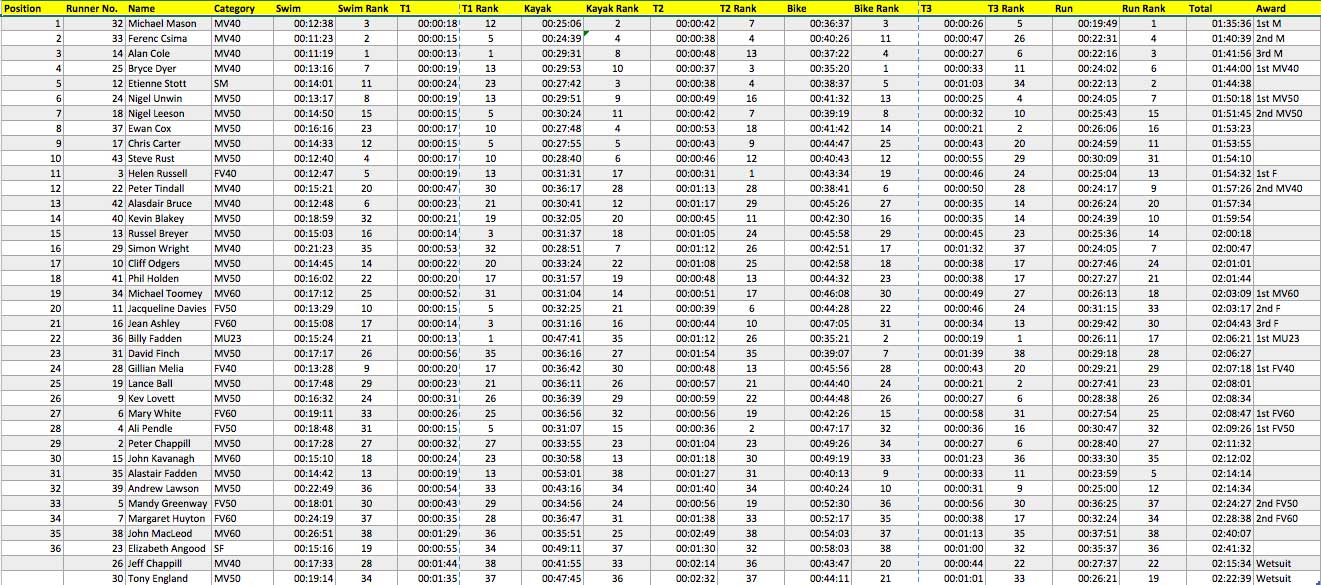

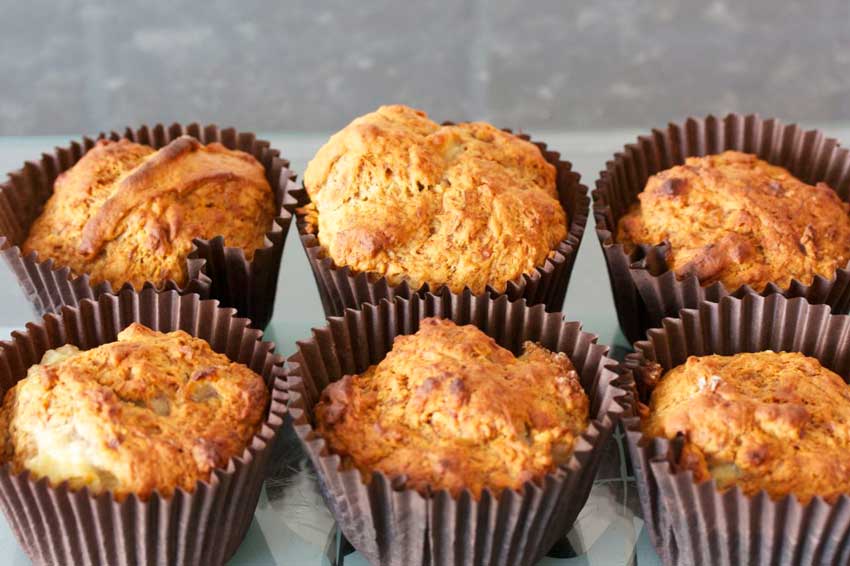

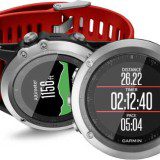
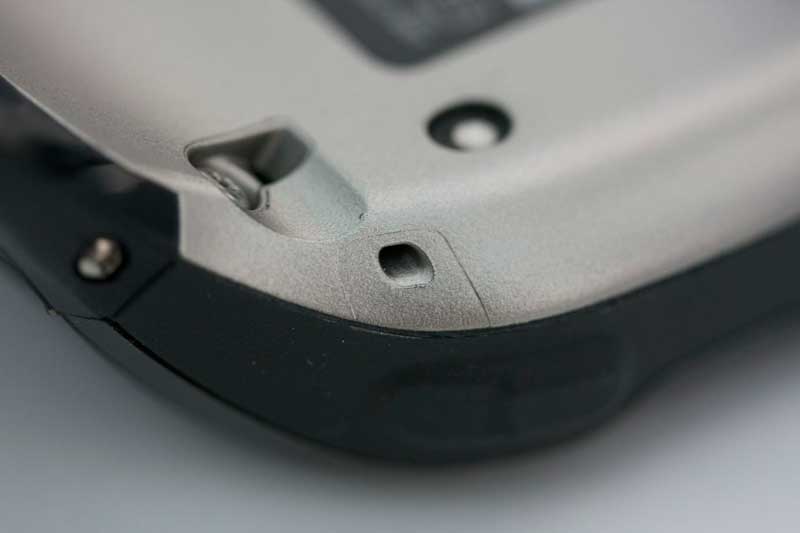


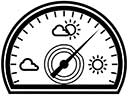







Yours( and Anna’s ) decision …you can’t have it all ! lol
A good read Alan!!
That was my first Quad and it’s clear what I need to work on. I did exactly the same analysis and also added in people’s position at the exit of each transition, which is interesting to see the gaps and position changes.
Do you have a Strava file? (I didn’t find you on Strava) Here are mine:
Swim – https://www.strava.com/activities/1703771366
Kayak – https://www.strava.com/activities/1703771432
Bike – https://www.strava.com/activities/1703771386
Run – https://www.strava.com/activities/1703771392
Cheers, Simon.
PS – We both know James Wingfield.
Hi Simon,
Yep, a quick look at your results from Sunday and I reckon some work on the swim my come in handy – Maybe you should be like me and fall out of your kayak more often, I get plenty of swim practise in that fashion! That said, the swim is such a short part of the entire race that it doesn’t make a huge difference as long as you have a half decent swim. I take it you come from a kayaking background? Not a bad thing for Quads as it’s quite a long portion of the race.
Are you doing the Fabian 4? – no swimming involved!
I am on Strava: https://www.strava.com/athletes/8930
Say Hi to James for me if you see him, would be good to see him out in a boat again soon.
Al.